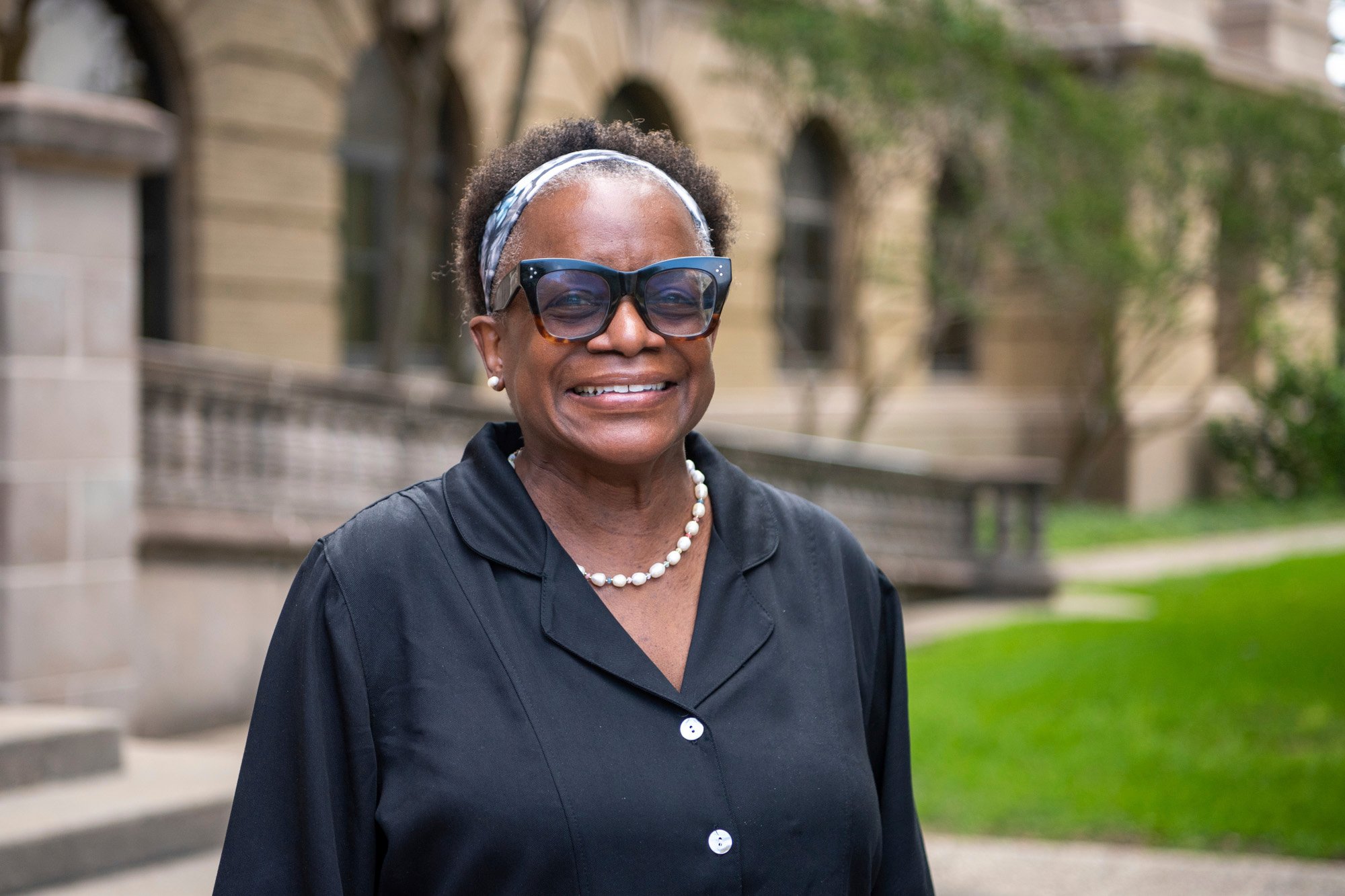Texas A&M University’s disgraceful treatment of celebrated journalism professor Kathleen McElroy should terrify anyone who cares about academic freedom, education, and equality in Texas. The state’s Republican leaders, along with Governor Greg Abbott, have launched a radical, McCarthyite crusade to purge education of liberal bias.
Only in Texas or Florida would decades of experience at the country’s most prestigious newspaper and a track record of championing newsroom inclusivity disqualify someone for a job relaunching A&M’s defunct journalism program, which was shuttered in 2004 after 55 years.
McElroy’s ordeal is just the beginning.
At first, A&M officials seemed to realize how lucky they’d been to snag McElroy, a Black woman who served in various managerial positions at the New York Times for 20 years before completing a doctorate at the University of Texas at Austin, where she served as the director of the School of Journalism and Media and now teaches.
McElroy didn’t want to draw attention to herself, but A&M insisted on a public ceremony to celebrate her appointment as head of the university’s new journalism program. On June 13, she signed an offer accepting a tenured position in front of a crowd gathered at the school’s academic building, pending approval from the Texas A&M University System Board of Regents.

Over the next few weeks, the deal unraveled. After conservative activist site Texas Scorecard published a scare-mongering article about McElroy’s work on newsroom diversity, right-wing ideologues on the board of regents started scrutinizing her hire. Six or seven regents called and texted now-disgraced University President Katherine Banks to express concerns.
“I thought the purpose of us starting a journalism program was to get high-quality Aggie journalist [sic] with conservative values into the market,” regent Jay Graham texted Banks. “This won’t happen with someone like this leading the department.”

The purpose of relaunching the major, Graham wrote, was to “get high-quality conservative Aggie students into the journalism world to help direct our message.”


Another regent, Mike Hernandez, added that McElroy was “biased and progressive-leaning” and called giving her tenure a “difficult sell” for the board.
Members of a conservative alum group called the Rudder Association and other right-wing Aggies flooded Banks’ office with calls and emails.
Text messages show that Banks—who initially denied any involvement in McElroy’s bungled hiring, then was caught lying—was fully behind conservatives’ efforts to rein in liberal academia: “Kathy [Banks] told us multiple times the reason we were going to combine [the colleges of] arts and sciences together was to control the liberal nature that those professors brought to campus,” Graham wrote.
So Banks watered down the offer to McElroy. Still eager to return to her alma mater to train the next generation of journalists, she agreed to accept a revised five-year, nontenured teaching position, which would not require the regents’ approval.
“You’re a Black woman who worked at the New York Times,” José Luis Bermúdez, the interim dean of the College of Arts and Sciences, warned McElroy. Her hire, he said, had been caught up in “DEI hysteria.”
But then, Banks diluted the offer further, offering McElroy a one-year, “at will” position. McElroy declined and spoke about how the university had treated her with the media.
“I’m being judged by race, maybe gender,” McElroy told the Texas Tribune. “I don’t think other folks would face the same bars or challenges.”
(Editor’s note: McElroy sits on the parent board of the Texas Observer. Because of our editorial independence policy, she has no say in our editorial decisions. Alongside this piece, today the Observer published a heartfelt essay from McElroy about her journalism journey and the irony of being the subject of media coverage rather than the one behind it. )
Over the summer, with the governor’s support, the Legislature passed Senate Bill 17 (SB 17), which requires institutions of higher education to do away with all diversity, equity, and inclusion programs and initiatives by 2024. Already, the University of Houston has shut down its Center for Diversity, Equity, and Inclusion as well as disbanding its LGBTQ+ Resource Center (under pressure, however, it appeared to backtrack, but it is only a matter of time before the offices are officially closed). Public universities across the state have formed committees to implement the law and seek input from the academic community. It’s clear, however, that days are numbered for all the offices and programs that help students from different backgrounds.
While the ostensible goal of anti-diversity, equity, and inclusion (DEI) efforts is to prioritize merit over race in higher education—and get rid of all the “divisive” diversity stuff that liberal academics champion—the real intent is to put radical, uppity queers, minorities, and liberals in their place. A key part of the plan is to strip liberal academics of the protections that allow them to pursue research and speak publicly without fear of reprisal; this past session, right-wing legislators tried to get rid of tenure but settled on more modest restrictions. The Senate also passed a ban on “critical race theory,” an academic theory that posits racism is embedded in society, but the House failed to pass the measure.
The conservative campaign to harass the libs out of academia has already sent a chill through Texas’ world-class public universities, making professors and administrators so fearful of setting off the lunatics in charge at the Capitol that they censor themselves—in scholarship or in their communications with students and the public.
The Observer reached out to around a dozen people at public universities across the state—Texas State, UT-Austin, the University of North Texas, and the University of Houston—about the future of diversity initiatives. For fear of losing their jobs or facing other consequences at the hands of the right-wingers on their boards of regents and the radicals in the Lege, none would speak, even anonymously, about the future of DEI post-SB 17.
Anti-DEI hysteria will lead to a brain drain at Texas’ public universities. Academics at most institutions enjoy the freedom to conduct scholarship without interference. To ensure they can pursue ideas that may be unpopular to the public and pursue knowledge for its own sake, they are granted protection after demonstrating excellence in their field. The best scholars don’t want to work in a place where they have to worry that criticizing wingnut politicians will get them put on leave—as A&M did when Lieutenant Governor Dan Patrick complained to administrators about criticism levied against him by opioid expert Joy Alonzo—and the best students from around the country will choose institutions that value academic freedom, openness, and inclusion rather than those under siege by the radical right.
Simplistic thinking about race—in which people and systems turn a blind eye to racism and let racist social forces run amok—actually enables racism.
The law is meant to exclude the people Republicans don’t like, which is precisely how McElroy felt: “They don’t want me there,” she concluded after receiving the third, shamefully diminished offer.
As if to demonstrate the absurdity of conservatives’ conceptions of meritocracy and colorblindness, none of the members of the A&M Board of Regents inquired about McElroy’s work, credentials, or qualifications as a professional and teacher.
Upon hearing that she was a Black woman who had worked at the Times and tried to improve newsroom diversity, they stereotyped her as a crusading, “woke” ideologue who stood in the way of their plan to deliberalize academia and mint grads “with conservative values into the market.”
It is textbook discrimination, and it shows how simplistic thinking about race—in which people and systems turn a blind eye to racism and let racist social forces run amok—actually enables racism.
Last month, A&M offered McElroy a settlement to avoid legal action and apologized for how it treated McElroy. McElroy accepted the settlement but will remain in her tenured post at UT-Austin.
McElroy has nurtured countless young journalists from across the country—some of color, plenty not—whose careers blossomed because of her help, support, instruction, and encouragement. Former students have described McElroy as a “dream professor” as well as ”inspiring,” “kind,” “caring,” and “funny.”
“If you asked me to give you adjectives about Kathleen, the word ‘woke’ wouldn’t be on my list,” said R.B. Brenner, who hired McElroy at UT-Austin and now teaches journalism at Stanford University. “It would be ‘empathetic,’ ‘extremely intelligent,’ ‘caring,’ ‘open-minded.’”
McElroy is not an ideologue. She’s a professional respected across the industry with a long career, someone who champions journalism’s core values of accuracy, fairness, and telling the truth. Her work on newsroom diversity, in fact, goes hand-in-hand with these. At its core, DEI is about helping people who feel they don’t belong to feel empowered instead.
“We all struggle with that sense of belonging,” she has said in describing her work. “You belong. You absolutely belong.”
Diversity and inclusion in journalism isn’t radical; it is at the core of what we do. Newsrooms with little to no diversity fail in conspicuous and embarrassing ways to serve the communities they are supposed to represent. One needn’t look any further than Fox News’ disastrous, erroneous coverage of the 2020 election—which has already cost the company $1 billion—to see the problem with having no diversity in leadership or in the ranks of the journalists.
Ensuring that the workforce at a pencil factory represents society may be a noble goal that those of us who believe in equity would support on principle, but it’d be hard to argue that the factory will make better pencils as a result. That’s not the case in journalism, where having writers and editors with different identities directly affects the editorial product, expanding the types of stories that get told and how deeply.
The point is not to exclude or denigrate white people, but to include them alongside those not historically represented in the media. Whether talking about race, social class, gender, sexual orientation, or gender identity, the greater the range of experience on staff, the better the journalism. Having Latinx reporters from immigrant backgrounds, for instance, helps newsrooms cover immigration more fully; with direct connections to the community they’re reporting on and familiarity with how the issues affect them, journalists know where to go and can delve deeper.
Diversity and inclusion in journalism isn’t radical; it is at the core of what we do.
Arguably, what’s most striking about conservative DEI hysteria is that, like so much of Republicans’ performative governance, it is a solution in search of a problem. Rather than addressing real issues like public corruption or worker safety, they focus on nonexistent, hypothetical problems like kids and drag shows. White kids are not facing discrimination at public universities because professors like McElroy want to help students with no journalists in the family or connections to the field break through alongside students who have had more opportunities.
Shuttering the Center for Diversity, Equity, and Inclusion and the LGBTQ+ Resource Center at the University of Houston will not help white kids succeed nor make the academic experience at the school more meritocratic. It’ll just mean queer students who are suicidal or in danger of dropping out because their families disapprove of them will stumble and fall instead of getting back up. It will mean Black or Latinx students who are the first in their families to go to college won’t have a designated place to get help from those who understand where they’re coming from.
It is alarming to see just how little the ignorant conservative activists that Abbott appointed to the A&M Board of Regents know about journalism or care about academic freedom. At the same time Graham wrings his hands over McElroy and potential “bias,“ he says the purpose of producing conservative journalists is to “help direct our message.”
Journalism isn’t about directing a message. It’s about telling the truth, and the truth is that Republicans’ crusade against DEI has nothing to do with fairness or education quality or rooting out bias or protecting white kids. It’s all about remolding Texas’ prestigious universities in conservatives’ image and driving away all of us out who do not fit into that vision.
Join Kathleen McElroy in conversation with Annette Gordon-Reed, author of the Pulitzer Prize-winning On Juneteenth, on October 19 at the Stateside at the Paramount Theatre. Both women are appearing as part of a fundraiser for the Texas Observer. The Observer will also honor McElroy with a special MOLLY First Amendment Prize for her achievements in journalism education and commitment to academic freedom. #StandWithTheObserver #TexasNeedsAnObserver.







